Reviews
Josef von Sternberg
USA, 1930
Credits
Review by Jenny Jediny
Posted on 18 August 2010
Source Universal DVD
Categories von Sternberg & Dietrich
In Josef von Sternberg’s Morocco, everything is as it seems, and yet nothing is as it seems. The love triangle that unfolds in the desert heat is in turn cliché and delirious, but Morocco maintains a singular aura throughout, one of exoticism both in its setting and in the emotions it inspires. Von Sternberg has stated, “The average human being lives behind an impenetrable veil and will disclose his deep emotions only in a crisis which robs him of control.” For Morocco’s Amy Jolly, it is the revelation of love beyond passion that will cause the lady to revoke her carefully learned methods of self-control.
The question of self-control is in the cards from the start, as Amy conceals both her emotions and her body with a head-turning choice of clothing. Marlene Dietrich’s Hollywood debut, Morocco is perhaps best known for its star’s cross-dressing cabaret performance. Dietrich, outfitted in a top hat and tails, regales an initially reluctant crowd (save Gary Cooper’s intrigued, applauding soldier), topping it all off with a quick but very deliberate kiss for a female onlooker, flush on the mouth. This scene sums up contemporary love for all that is Dietrich: the androgyny, the overt sexuality, and that cool, collected gaze from Dietrich that quickens the pulse. However, this is not wholly representative of Morocco—while there is no doubt that Dietrich’s Amy Jolly is a woman who readily embraces her sexual needs, von Sternberg is more interested here in examining the boundaries of obsession and the threat of being a slave to one’s desire.
Amy’s nights are split between Cooper, as Légionnaire Tom Brown, and Adolpe Menjou’s wealthy La Bessiere. It appears to be a classic case of lust versus love: La Bessiere is a comfortable, affectionate partner, as he loves Amy in a way that provokes him to do anything for her, even if that includes chauffeuring her around half of Morocco in search of her younger lover. While Brown also loves Amy — his schoolboy’s carving of her name into a wooden table is both his only emotional reveal and a catalyst for the dramatic last act — he refuses to do anything about it. Tom’s desire to maintain his personal autonomy will unravel Amy’s last grasp on her own self-reliance, as she eventually relinquishes everything for a man.
The unyielding passion that Amy holds for Tom despite his apathy may be the most difficult aspect of Morocco to accept. What initially appears as pure flirtation and one in a series of torrid affairs takes hold of Amy’s entire being; depicted by Dietrich with silent intensity, Amy’s panic attacks over her lover’s comings and goings into desert battle are worthy of Emily Brontë in their turbulence. This display of devotion is what raises the question of why Amy would find Tom worthy of such love, when he is the kind of man who found leaving a lipstick note on a mirror an appropriate method of saying farewell. But von Sternberg isn’t interested in dissecting the why of anyone in Morocco—he wants to know how they feel, and to show the destructive nature of such sentiment.
Sweepingly romantic, Morocco is a grand gesture that extends twofold: there is the triumph of aesthetics, in the pure pleasure of watching the sand drift off the Sahara dunes, and Dietrich and Cooper freely cavort in von Sternberg’s opulent playground. Then there is Dietrich’s final struggle through the sand, as she casts her heels and material comforts aside. Victory for some, defeat for others—regardless, it appears as though another chapter of Amy Jolly’s life is simply unfolding.
More von Sternberg & Dietrich
-
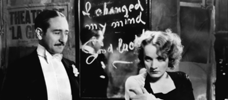
Morocco
1930 -
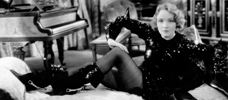
Dishonored
1931 -
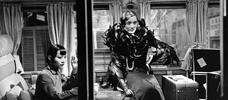
Shanghai Express
1932 -
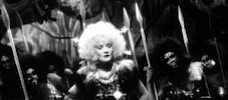
Blonde Venus
1932 -
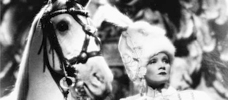
The Scarlet Empress
1934 -
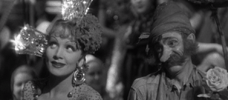
The Devil is a Woman
1935
We don’t do comments anymore, but you may contact us here or find us on Twitter or Facebook.



